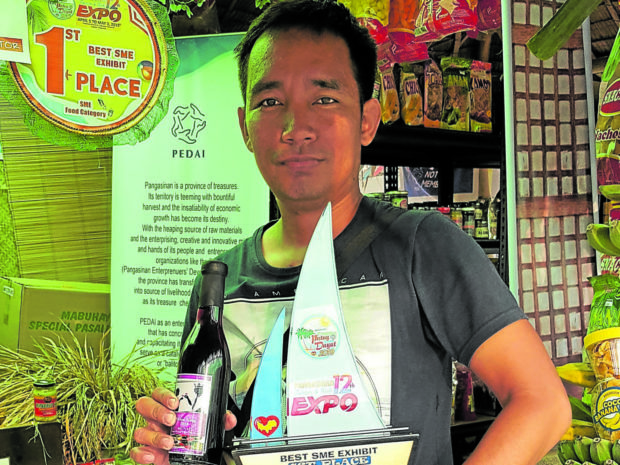Sales down, but local winemaker keeping spirits up
DAGUPAN CITY, Pangasinan, Philippines — Despite the restrictions imposed by the government to contain the coronavirus pandemic, not a few Filipinos were still able to have a drink and be merry — as shown by the sales boost of some liquor products.
But a maker of local wines based in this city suffered supply and distribution problems brought by the prolonged lockdown and the accompanying liquor ban.
Sales of Nature’s Winery soared after it began commercial production in 2017. This was before the pandemic.
“We were doing well. Our different fruit wines were a hit during trade fairs and we were able to open markets in Metro Manila and the southern provinces. But when the pandemic struck and the provincial government of Pangasinan imposed a liquor ban, we could not move our stocks,” said Ferdinand Nipaz, who owns Nature’s Winery.
Checkpoints barred entry to all shipments of alcoholic beverages, he said. Travel restrictions also made it difficult for him to buy fruits across the border.

‘WE WERE DOING WELL’ Ferdinand Nipaz, owner of Nature’s Winery in Pangasinan province, looks forward to a postpandemic business recovery. —CONTRIBUTED PHOTO
Discoloration
Nipaz sought to revive his business after quarantine restrictions were eased in August and the liquor ban was lifted.
But his loyal customers at trade fairs, which used to give the company brisk sales, have now shifted to the ornamental plant market, he said.
Recently, he had to offer hundreds of bottles of unsold fruit wines at a discount.
Lengthy storage of fruit wines trigger discoloration, Nipaz said.
“For instance, our mangosteen wine, named ‘Selosa,’ is dark red but the color fades after two years,” he said.
Most wines have a maximum shelf life of four years, although some brands can retain their flavor for six years, he added.
Most promising product
Nipaz has produced wines from guava, bignay berries, pineapple, passion fruit, watermelon, cashew, duhat (Java plum), star apple, guyabano (soursop) and mangosteen, and even roses and santan flowers.
Nature’s Winery produced a “hit” brand using roses, but stopped because the supply of flowers could not be sustained.
Nipaz said some customers preferred his wines for their medicinal value.
He was also able to transform ampalaya (bitter melon) into a smooth wine. The product, labeled “Bitter Love,” became a bestseller especially on Valentine’s Day.
Nipaz, a civil engineer, admitted that he was “not a wine drinker” himself. But he remembered being “brokenhearted” in 2015 when he returned home from Iraq, and his old passion for chemistry was aroused when he decided to gather up fallen guava fruits.
He considered the most promising local wine to be the one made from bignay because it can compete with expensive red wines made from grapes.
“We don’t grow grapes here for wineries; we only produce table grapes in La Union,” he said. “The farmers there try to make red wine, but can’t match the expensive ones from other countries.’’
“But bignay can compete in taste and aroma when turned into red wine,” said Nipaz, who planted a 2-hectare property with bignay trees that he said should outlast the pandemic.
—Yolanda Sotelo
